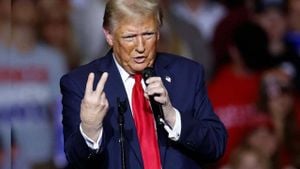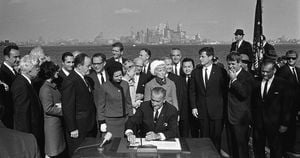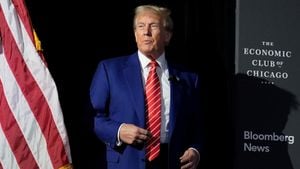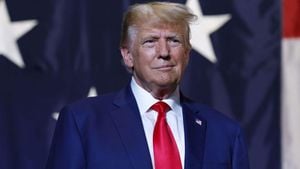Taiwan President Lai Ching-te arrived in Tuvalu on Wednesday as part of his Pacific tour aimed at solidifying international support for Taiwan against China's attempts to woo its remaining diplomatic allies. This visit is significant as it highlights Taiwan's proactive diplomacy amid growing tensions with Beijing, which asserts sovereignty over Taiwan and actively works to diminish its international presence.
Lai's Pacific tour marks his first overseas trip since taking office earlier this year, reflecting his government’s commitment to maintaining and strengthening Taiwan's relationships with its few remaining allies. Out of the 12 countries still recognizing Taiwan, Tuvalu is among those facing pressure from Beijing to switch allegiances.
Upon arriving, Lai was welcomed by Tuvalu's Prime Minister Feleti Teo, Governor-General Tofiga Vaevalu Falani, and local schoolchildren, who performed traditional songs and dances. "When I disembarked and saw Tuvaluan students waving the national flags of our two countries, I strongly felt the people's firm commitment to our diplomatic alliance," Lai expressed, as translated by his aides. He wore a colorful, casual shirt adorned with native flowers, reflecting the friendly atmosphere of the event.
The collaborative relationship between Taiwan and Tuvalu spans across various sectors, including development assistance, technology, and climate initiatives. Prime Minister Teo expressed gratitude for Taiwan’s contributions, particularly mentioning the funds provided to support Tuvalu's purchase of undersea internet cables, which are pivotal for the nation’s connectivity and development, and Taiwan's financial aid for climate action programs.
During his visit, Lai indicated his desire for both nations to broaden their partnerships, aiming to deepen cooperation across multiple fronts. A joint communiqué was signed, outlining intentions to advance their comprehensive partnership. This document emphasizes the mutual benefits of sustaining their diplomatic relationship, which has faced growing challenges from China's increasing assertiveness.
Lai's diplomatic mission continued with subsequent stops, including the Marshall Islands and the U.S. territory of Guam, where he again emphasized the importance of maintaining ties with allied nations. His visit to these Pacific Islands is not just about reinforcing diplomatic ties but also about countering Beijing's influence, which has successfully persuaded several countries to recognize it instead of Taipei.
China has increasingly engaged with Pacific nations through various initiatives and economic investments, often leading to defections from Taiwan. This has pushed Lai’s administration to seek new alliances and to reinforce existing ones. The past few years have seen Taiwan lose several diplomatic partners to Beijing, often through significant economic incentives offered by China.
Lai’s administration emphasizes Taiwan's sovereignty and its right to engage fully on the global stage, juxtaposed with China requiring nations to adhere to its One China policy, which dismisses Taiwan's sovereignty. This sensitivity surrounding Taiwanese identity shapes Lai's diplomatic approach, stressing the nation's democratic values and its contributions to global issues such as climate change and regional security.
During the various ceremonies and meetings on his tour, Lai engaged directly with the local populations, showcasing Taiwan's commitment to cooperative diplomacy. This visit to Tuvalu and the broader Pacific region highlights Taiwan's role not just as a participant but as a significant partner capable of advocating for joint development efforts.
His official itinerary also includes diplomatic discussions focused on technology transfer and environmental cooperation, emphasizing the mutual advantages of maintaining alliance structures amid regional uncertainties. The findings from this tour will likely influence Taiwan's future diplomatic strategy, particularly its approach to countries under increasing pressure from Beijing.
Overall, President Lai Ching-te's tour of Tuvalu forms part of Taiwan's broader strategy to reinforce its alliances and stabilize its diplomatic standing. With China continuing to capitalize on its extensive reach and influence, the need for Taiwan to advocate for its sovereignty has never been more pressing. Lai's diplomatic outreach not only aims to shore up existing relationships but also seeks to create new opportunities for bilateral cooperation and lasting partnerships across the Pacific.



